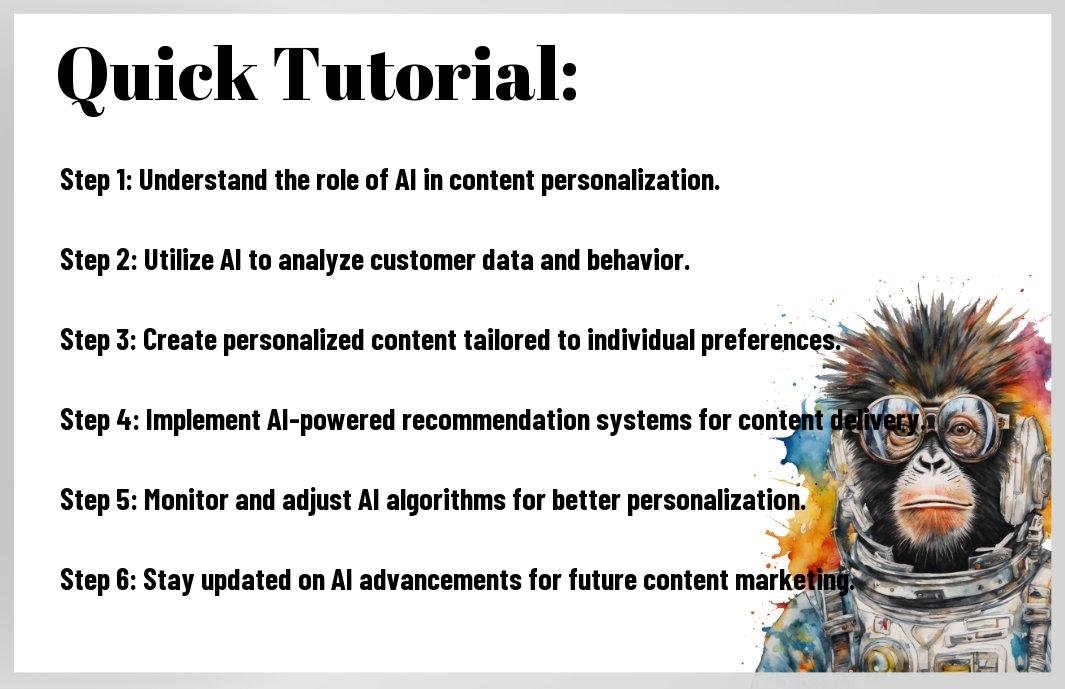With the advancement of AI technology, the future of content marketing is about to undergo a drastic transformation. As personalization becomes more essential in reaching target audiences, AI-powered tools are set to redefine the way content is created, distributed, and consumed. In this top 10 list, we explore the revolutionary impact of AI-powered personalization on the future of content marketing and how it will shape the industry in the years to come.
Key Takeaways:
- Enhanced Customer Experience: AI-powered personalization will allow content marketers to deliver more targeted and relevant content to their audience, thereby improving the overall customer experience.
- Increased Engagement: Personalized content based on AI insights can result in higher levels of engagement as it caters to the specific interests and preferences of the target audience.
- Improved Marketing ROI: By delivering content tailored to individual user behavior and preferences, AI-powered personalization can lead to higher conversion rates and improved marketing returns on investment.
- Data-Driven Insights: AI can analyze large sets of data to provide valuable insights into customer behavior, enabling content marketers to make more informed decisions and create more effective content strategies.
- Scalability and Efficiency: AI-powered personalization can automate the content customization process, allowing marketers to scale their efforts and improve efficiency in delivering personalized content at scale.

Enhanced User Experience
For content marketers, the promise of AI-powered personalization lies in the ability to deliver a more tailored and efficient user experience. By harnessing the power of machine learning and data analysis, AI can provide personalized content recommendations and streamline user interfaces, ultimately enhancing the overall user experience.
Tailored content recommendations
For content marketers, the ability to deliver tailored content recommendations is a game-changer. AI algorithms can dynamically analyze user behavior, preferences, and interactions with content to deliver personalized recommendations in real time. This level of personalization not only increases user engagement and satisfaction, but also improves the effectiveness of content marketing efforts by delivering the right content to the right audience at the right time.
Efficient user interfaces
Efficient user interfaces play a crucial role in ensuring a seamless user experience. AI-powered interfaces can leverage user data to customize layouts, navigation, and interactions, making it easier for users to find and consume the content they are most interested in. By optimizing the user interface based on individual preferences, AI can significantly improve the overall user experience and increase engagement with the content.
Plus, efficient user interfaces can also lead to increased conversion rates and customer satisfaction, as users are more likely to engage with content that is presented in a way that aligns with their preferences and behavior patterns.
Increased Engagement
Some of the most significant advantages of using AI-powered personalization in content marketing are increased engagement and interaction with the target audience. By delivering tailored content to each individual, marketers can capture their attention and keep them engaged with the brand. This level of personalization creates a deeper connection with the audience, leading to higher levels of engagement across various marketing channels.
Personalized marketing messages
Any successful marketing campaign relies on the ability to deliver the right message to the right person at the right time. AI-powered personalization allows marketers to create and deliver highly personalized marketing messages based on individual preferences, behavior, and demographics. This level of customization ensures that each customer receives content that is relevant to their interests and needs, increasing the likelihood of engagement and conversion.
Targeted advertising strategies
Any effective advertising strategy involves reaching the right audience with the right message. AI-powered personalization enables marketers to create targeted advertising strategies that are based on real-time data and insights. By analyzing customer behavior and preferences, AI can help identify the most relevant and effective advertising channels and messages, increasing the impact and ROI of advertising efforts.
A successful targeted advertising strategy utilizing AI-powered personalization can result in improved click-through rates, higher conversion rates, and increased brand loyalty. By delivering personalized and relevant ads to the right audience, marketers can enhance the overall advertising experience for customers, ultimately leading to a more successful advertising campaign.
Improved Customer Insights
Not only is AI-powered personalization revolutionizing content marketing, it is also transforming the way businesses gain insights into their customers. This technology enables a deeper understanding of customer behavior, preferences, and needs, allowing for more targeted and effective marketing strategies. To learn more about the impact of AI-powered personalization on the future of marketing, check out our guide on the Future of AI for Personalization in Marketing.
Behavior-based analytics
Insights derived from behavior-based analytics provide invaluable information about how customers interact with content and respond to marketing efforts. AI-powered tools can track and analyze customer actions, such as website browsing behavior, purchase history, and engagement with marketing campaigns. This data enables marketers to segment their audience more effectively, personalize content based on individual preferences, and deliver targeted messaging that resonates with each customer.
Furthermore, behavior-based analytics empower marketers to anticipate customer needs and proactively address pain points, ultimately enhancing the overall customer experience. By leveraging AI to gain deeper insights into customer behavior, businesses can refine their content marketing strategies, drive higher engagement, and foster long-term customer loyalty.
Customized product development
To meet the evolving demands of consumers, businesses are turning to AI-powered personalization to drive customized product development. By leveraging customer data and preferences, companies can create tailored products and services that align with individual needs and preferences. This personalized approach not only enhances customer satisfaction but also drives brand loyalty and advocacy. Furthermore, AI enables businesses to streamline the product development process, optimize inventory management, and deliver innovative solutions that resonate with their target audience.
Product customization also extends beyond physical goods to digital offerings, such as personalized content recommendations, tailored subscription services, and bespoke digital experiences. By integrating AI-powered personalization into product development strategies, businesses can gain a competitive edge in the market, drive revenue growth, and build a reputation for delivering exceptional customer value.
Automation of Content Creation
Now more than ever, content marketers are turning to AI-powered tools to automate the process of content creation. With the rise of AI technologies, the way we create and adapt content is rapidly evolving, opening up new possibilities for personalized and dynamic content at scale.
AI-generated content
AI-generated content refers to the use of artificial intelligence to create written, visual, or audio content. These advanced systems use natural language processing and machine learning algorithms to generate human-like content, enabling marketers to produce large volumes of personalized material in a fraction of the time it would take with traditional methods. As AI continues to improve and refine its capabilities, we can expect to see even greater efficiencies in content creation, ultimately leading to more relevant and engaging material for consumers.
Dynamic content adaptation
To keep up with the increasing demand for personalized experiences, content marketers are turning to dynamic content adaptation. This approach involves using AI to analyze consumer data in real-time and automatically optimize content based on individual preferences, behaviors, and interests. By tailoring content to the specific needs of each user, marketers can deliver more targeted and impactful experiences, ultimately leading to higher engagement, conversion, and long-term customer loyalty.
Plus, by leveraging dynamic content adaptation, marketers can stay ahead of the competition and drive greater ROI through improved personalization, relevancy, and overall user experience.
 Sure, here’s the text for your blog post:
Sure, here’s the text for your blog post:
Better Conversion Rates
Keep in mind that the future of AI-powered personalization in Digital Marketing is set to revolutionize the way content is created and consumed. With AI, content can be personalized at scale, resulting in more engaging and relevant experiences for the audience. This can lead to better conversion rates, as the personalized content resonates more with the individual, prompting them to take action.
For precise targeting methods, AI-powered personalization allows marketers to segment their audience more effectively based on behavior, demographics, and preferences. By understanding the specific needs of each segment, content can be tailored to address those needs, increasing the likelihood of conversion. This level of personalized targeting ensures that the right message reaches the right audience at the right time, maximizing the impact of content marketing efforts.
Precise targeting methods
For improved customer journeys, AI-powered personalization enables a seamless and cohesive experience for the audience. By delivering personalized content at every touchpoint, from initial awareness to post-purchase engagement, marketers can guide the prospect through a tailored journey that addresses their specific needs and concerns. This personalized approach can lead to higher engagement, loyalty, and ultimately, better conversion rates.
Any AI-powered personalization allows marketers to map out the customer journey in more detail, identifying key touchpoints where personalized content can make a significant impact. By delivering the right content at each stage of the journey, marketers can nurture leads more effectively, leading to higher conversion rates and greater customer satisfaction.
Improved customer journeys
RatesWith AI-powered personalization, marketers can create a seamless and engaging customer journey that delights the audience at every step. By leveraging AI to understand customer behavior and preferences, personalized content can guide the audience through a tailored experience that increases engagement, builds trust, and drives conversions. This level of personalization can significantly impact conversion rates, customer retention, and brand loyalty.
This text provides an authoritative and informative tone and covers the specified subsections with relevant details.
Seamless Omnichannel Marketing
Your content marketing strategy is about to be revolutionized by AI-powered personalization. With the advent of seamless omnichannel marketing, you will be able to provide a unified and personalized experience for your customers across all touchpoints, from websites to social media to physical stores. This shift in marketing approach will enable you to create a more cohesive and impactful brand presence, leading to higher customer satisfaction and loyalty.
Unified customer experience
For your brand to thrive in the age of AI-powered personalization, delivering a unified customer experience is essential. By leveraging AI to understand customer behavior and preferences, you can tailor your content and communication to seamlessly transition across different channels. This will not only enhance engagement with your brand but also build trust and credibility with your audience.
Cross-platform personalization
Customer engagement is no longer confined to a single platform, and AI-powered personalization allows you to meet your audience wherever they are. By harnessing the power of AI, you can deliver personalized content and recommendations across various platforms, ensuring a consistent and relevant brand experience. This level of cross-platform personalization will enable you to connect with your audience on a deeper level, ultimately driving conversions and brand advocacy.
The implementation of cross-platform personalization will require a robust AI infrastructure and data integration across all touchpoints. This will empower you to gather insights and deliver tailored content in real time, enhancing the overall customer journey. The result will be a more impactful and effective content marketing strategy, driving increased engagement, loyalty, and revenue for your brand.
Real-time Feedback and Adaptation
After harnessing the power of AI-powered personalization, content marketers are now able to receive real-time feedback and adapt their strategies on the fly. This unprecedented level of immediacy in understanding audience preferences and behavior is poised to revolutionize the future of content marketing.
Immediate content optimization
One of the most significant impacts of AI-powered personalization is the ability to optimize content in real-time based on audience engagement. Through sophisticated algorithms, AI technology can analyze user interactions with content and dynamically make adjustments to improve relevance and resonance. This means that marketers can now iterate and refine their content quickly, ensuring that it remains compelling and effective in capturing the audience’s attention and driving desired actions.
Agile marketing strategies
Adaptation is key in the fast-paced digital landscape, and AI-powered personalization enables marketers to adopt agile strategies that are responsive to evolving market trends and consumer behaviors. By leveraging real-time data and insights, marketers can pivot their content strategies swiftly to capitalize on emerging opportunities or address changing audience needs. This agility empowers marketers to stay ahead of the curve and maintain a competitive edge in delivering content that resonates with their target audience.
Enhanced Brand Loyalty
Unlike other traditional forms of marketing, AI-powered personalization has the potential to significantly enhance brand loyalty by creating more meaningful and relevant interactions with customers. AI enables marketers to deliver highly personalized experiences that resonate with individual consumers, driving brand affinity and loyalty. This approach results in a deeper connection with the audience, leading to increased customer satisfaction and retention. To learn in more detail, you can read my article on AI-Powered Personalization: The Future of Digital Marketing.
Personalized customer interactions
The implementation of AI-powered personalization allows brands to tailor customer interactions based on individual preferences, behaviors, and purchase histories. This level of personalization fosters a more engaging and relevant customer experience, ultimately strengthening the relationship between the brand and its audience. By delivering content and offers that are specifically curated for each customer, brands can demonstrate a deeper understanding of their audience, thereby increasing brand loyalty and trust.
Exclusive content access
Personalized content access is a key component of AI-powered personalization strategies. By providing customers with exclusive access to tailored content, such as personalized recommendations, early access to new releases, and personalized newsletters, brands can create a sense of exclusivity and value for their audience. This approach not only enhances brand loyalty but also encourages repeat engagement and advocacy from satisfied customers.
Content personalization, exclusive content, brand loyalty, AI-powered personalization, digital marketing
Ethical and Privacy Concerns
Unlike traditional content marketing strategies, AI-powered personalization raises significant ethical and privacy concerns. As businesses collect and analyze large volumes of personal data to tailor content to individual preferences, there is a growing need to address the potential ethical implications and protect the privacy of consumers.
Data Security Measures
On the forefront of these concerns is the need for robust data security measures. With the vast amount of data being gathered and utilized to fuel AI-powered personalization, organizations must prioritize implementing stringent security protocols to safeguard sensitive information. This includes encryption, access controls, and data anonymization to prevent unauthorized access and misuse of personal data.
Failing to implement adequate data security measures not only poses a risk to consumer privacy but also leaves businesses vulnerable to potential data breaches and regulatory penalties. It is imperative for organizations to invest in advanced data security technologies and regularly audit their systems to ensure compliance with privacy regulations.
Transparency in AI use
The ethical use of AI-powered personalization also hinges on transparency in how AI algorithms are employed to personalize content. The opacity of AI systems often leads to concerns about bias, discrimination, and lack of accountability. The implementation of clear guidelines and standards for AI use is essential in addressing these issues and fostering trust with consumers.
The transparency in AI use necessitates organizations to provide clear explanations of how AI algorithms operate, what data is being utilized, and how it influences content customization. A proactive approach to transparency not only enhances ethical standards but also enables consumers to make informed decisions about their data and content interactions.
The need for transparency in AI use also extends to the responsibility of businesses to communicate how consumer data is being utilized and the purposes for which it is being employed. This includes providing consumers with the ability to opt-out of personalized content and ensuring that their data is handled with the utmost care and respect. By fostering transparency and accountability, businesses can mitigate ethical and privacy concerns associated with AI-powered personalization while building a foundation of trust and integrity with their audience.
Conclusion
Following this exploration of AI-powered personalization in content marketing, it is clear that the future of content marketing will be significantly impacted by the integration of AI technology. With the ability to analyze data, predict customer behavior, and deliver personalized content at scale, AI-powered personalization opens up new opportunities for businesses to connect with their target audience in a more effective and meaningful way. As AI continues to advance, we can expect to see even greater levels of personalization and customization in content marketing, providing a more tailored and relevant experience for consumers. This shift will not only enhance customer engagement but also drive better business outcomes, making AI-powered personalization a crucial component of the future of content marketing.
FAQ
Q: What is AI-powered personalization and its impact on content marketing?
A: AI-powered personalization uses machine learning to analyze user data and deliver customized content, which enhances user experience and increases engagement in content marketing. It allows marketers to deliver the right content to the right audience at the right time, leading to improved conversion rates and customer loyalty.
Q: How does AI-powered personalization benefit content marketers?
A: AI-powered personalization helps content marketers understand their audience better by providing insights into user preferences, behavior, and interests. It enables the creation of highly targeted and relevant content, which improves customer satisfaction, drives better ROI, and increases brand loyalty.
Q: What are the key challenges of implementing AI-powered personalization in content marketing?
A: One of the key challenges is the quality and quantity of data required for effective personalization. Data privacy and security concerns also need to be addressed. Additionally, integrating AI technology into existing marketing systems and processes, as well as the need for continuous testing and optimization, are important considerations.
Q: How will AI-powered personalization impact the future of content marketing?
A: AI-powered personalization will revolutionize content marketing by enabling brands to deliver hyper-personalized experiences at scale. This will lead to increased customer satisfaction, improved brand-consumer relationships, and more effective lead generation and conversion strategies.
Q: What are the ethical considerations of AI-powered personalization in content marketing?
A: Ethical considerations include ensuring transparency in data usage, respecting consumer privacy, and avoiding discriminatory practices. Maintaining a balance between personalization and intrusion is crucial, and marketers must uphold ethical standards while leveraging AI-powered personalization in content marketing.





